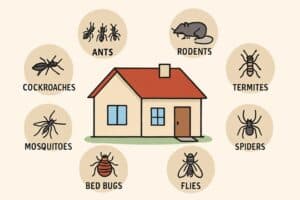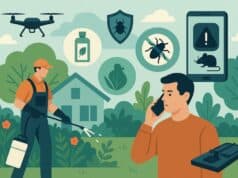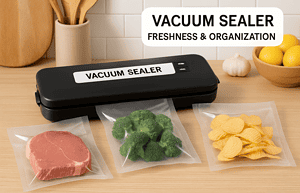Introduction
Household pests are an unavoidable challenge for most homeowners. Whether it’s ants sneaking across your counter or rodents causing commotion in the walls, these invaders can lead to both health concerns and costly damages. Staying proactive with prevention is your best defense, but if infestations do occur, timely action and expert help—even from resources specializing in Elizabethtown pest control—can make all the difference in reclaiming your living space.
Understanding what attracts common pests to your home and adopting practical solutions can go a long way toward keeping unwelcome guests out. From quick cleaning tips to structural repairs, acting before minor problems turn into major infestations is essential for a comfortable, pest-free environment.
In this guide, you’ll find targeted advice for tackling different pest problems—plus universal strategies for safeguarding your home all year round. Whether you’re dealing with a single ant trail or suspect a hidden infestation, knowing how to respond puts you in control.

Ants
Ants are among the most persistent household pests. Their ability to find the tiniest food crumbs and establish colonies in unlikely places can make eradication a challenge—something an experienced Elizabethtown exterminator knows all too well. Most species are attracted to sweet or greasy foods, and once a food source is established, they leave scent trails for the rest of their colony to follow.
Prevention and Control:
- Seal doors, windows, and foundation cracks to cut off entry routes.
- Store all food—including pet food—in airtight containers. Promptly clean up any spills or crumbs.
- Erase scent trails using white vinegar or lemon juice on ant pathways.
Cockroaches
Cockroaches thrive in moist, warm conditions, and can quickly multiply if not addressed early. These pests pose health risks, carrying bacteria that can contaminate surfaces and worsen respiratory ailments like asthma.
Prevention and Control:
- Repair plumbing leaks and eliminate excess humidity with dehumidifiers or fans.
- Maintain spotless kitchen and dining areas; avoid leaving dirty dishes overnight.
- Set up cockroach baits or sticky traps in cabinets, under sinks, and other dark hiding spots.
Rodents
Mice and rats are capable of squeezing through surprisingly small gaps to access food, water, and shelter inside your home. Once inside, rodents can gnaw through electrical wiring and insulation, making them a major cause of property damage and potential fire hazards.
Prevention and Control:
- Inspect and seal all gaps or holes around your foundation, siding, windows, and doors.
- Store grains, cereals, and other foods in durable, airtight containers.
- Set traps near likely entry points, behind appliances, or along walls where rodents travel.
Termites
Often called “silent destroyers,” termites can compromise a home’s wooden framework long before you notice any visible signs. Their appetite for cellulose-based materials (like wood and paper) means they can inflict significant structural damage over time.
Prevention and Control:
- Keep firewood, lumber, and mulch at least a few feet away from your home’s foundation.
- Address drainage problems and repair roof or gutter leaks to reduce wood moisture around your property.
- Schedule annual inspections by a termite professional for early detection and intervention.
Mosquitoes
Mosquitoes are more than a summertime annoyance—they’re vectors for diseases like West Nile virus and Zika. These pests breed rapidly in standing water, which can collect in clogged gutters, birdbaths, pet bowls, or unused plant pots around your yard.
Prevention and Control:
- Dump out any sources of stagnant water and regularly clean birdbaths or water features.
- Apply EPA-approved mosquito repellents on exposed skin and wear protective clothing when possible.
- Use screens on windows and doors, and consider planting mosquito-repelling foliage such as lavender or citronella.
Bedbugs
These tiny, blood-feeding insects are expert hitchhikers, spreading quickly from luggage, used furniture, or infested buildings. Bedbugs hide in mattress seams, baseboards, and cracks, emerging at night to feed.
Prevention and Control:
- Launder bedding, curtains, and clothing in hot water and dry thoroughly on high heat.
- Conduct regular checks for bedbug activity along seams and crevices of beds and upholstered furniture.
- Encapsulate mattresses and box springs with bedbug-proof covers to trap or deter them.
Spiders
Most spiders around the home are harmless and help control other insects, but venomous species such as the black widow or brown recluse should be handled with caution. They gravitate toward undisturbed areas such as basements, cellars, and storage spaces.
Prevention and Control:
- Declutter storage areas and lift boxes or objects off the floor.
- Seal points where utility lines or pipes enter your structure.
- Spray corners and windowsills with natural or chemical repellents as necessary.
Flies
House flies, fruit flies, and drain flies can quickly turn food preparation and dining areas into unsanitary nuisances. They’re drawn to exposed food, garbage, and damp or dirty drains—potentially spreading harmful bacteria in the process.
Prevention and Control:
- Empty and clean trash bins regularly. Use locking lids to help contain odors.
- Wipe up spills and keep counters clean, especially where food is prepared or served.
- Use fly traps, screens, or essential oil-based sprays to keep fly populations down.
General Prevention Tips
Consistent habits and routine inspections are your strongest allies in deterring pests. Here are universal tips to keep any infestation at bay:
- Deep clean often—don’t allow crumbs, dust, or spills to linger.
- Seal all points of entry, from doors and windows to gaps around pipes and crawlspaces.
- Keep moisture sources in check: fix drips, dry out basements, and use dehumidifiers as needed.
- Properly dispose of waste by keeping garbage covered and carrying it out before it accumulates.
- Schedule periodic professional inspections for early detection and peace of mind.
Persistent pest problems can disrupt your sense of safety and comfort at home. Adopting these preventative steps, staying vigilant, and calling in specialists when necessary will help you maintain a healthier and more enjoyable living environment for your family.








